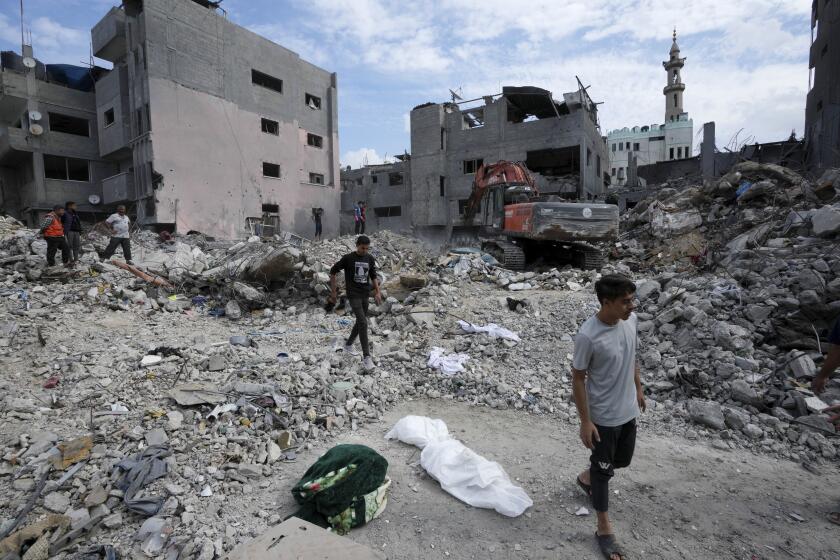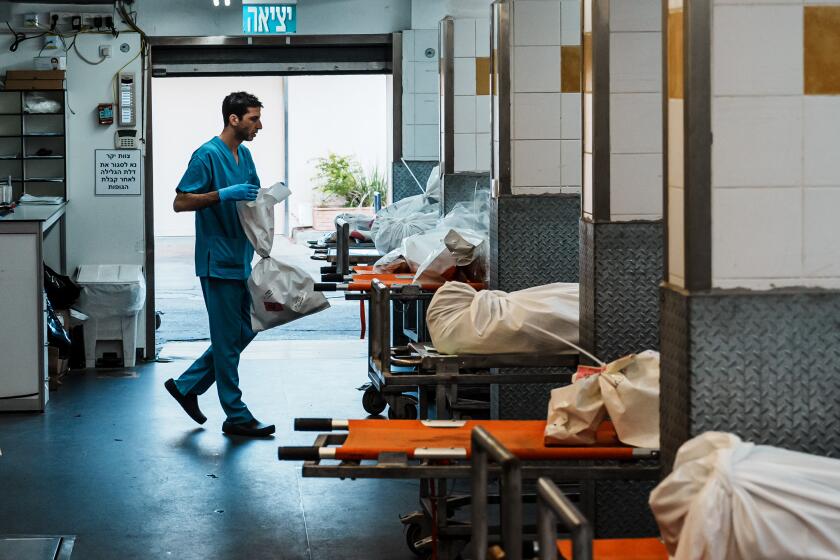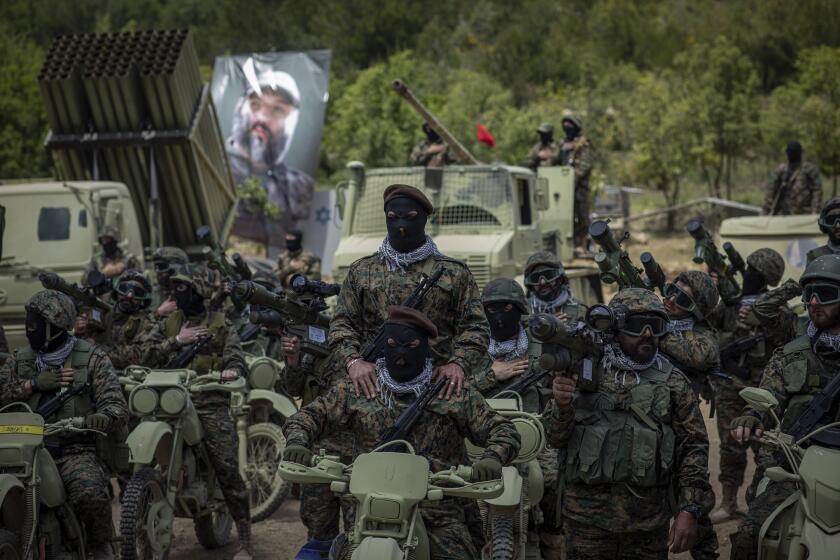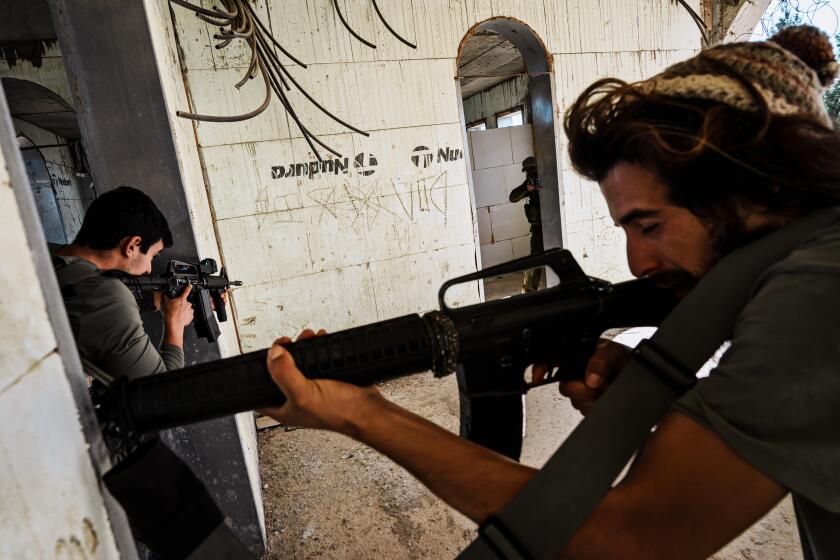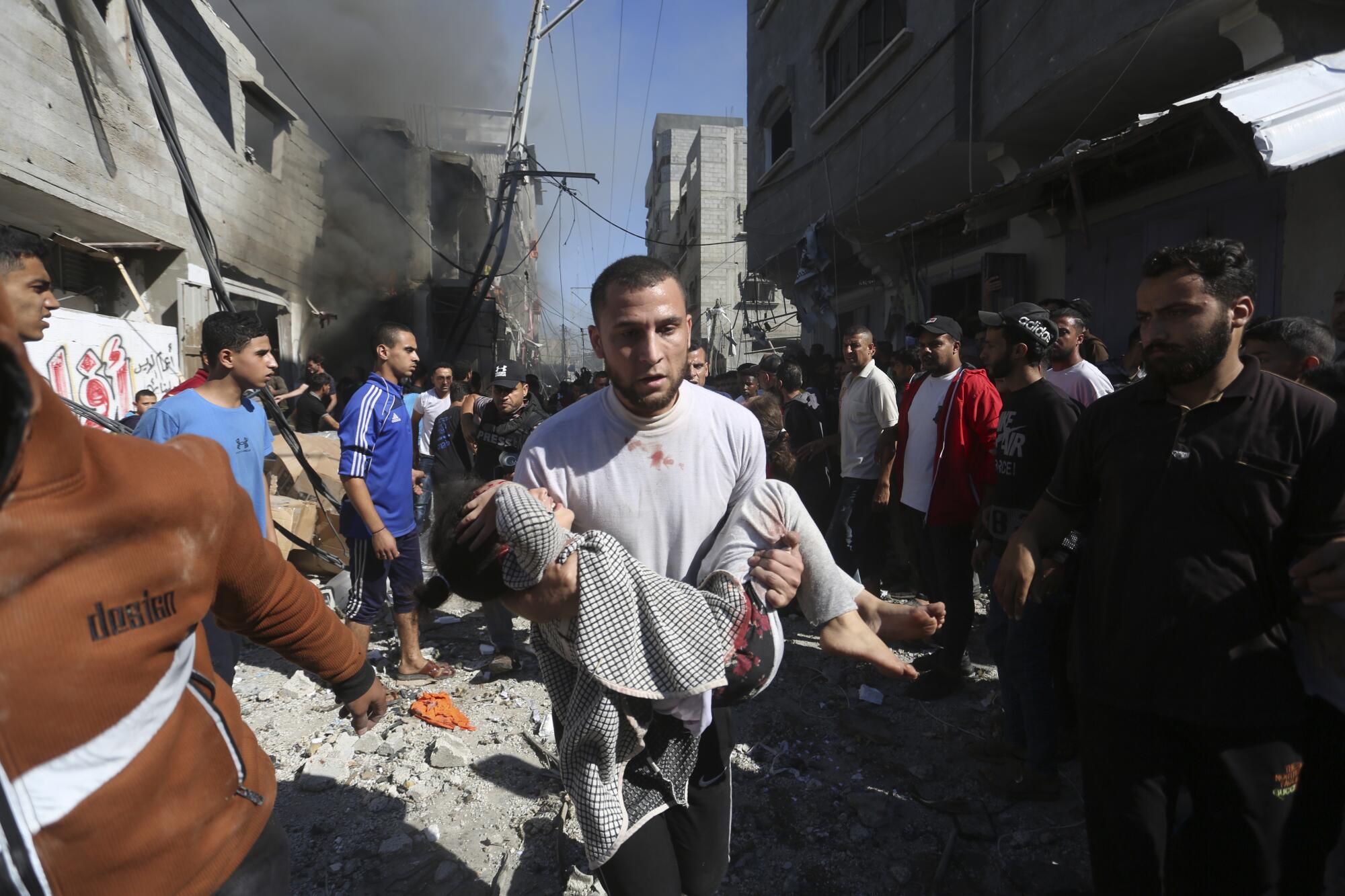
- Share via
DEIR AL BALAH, Gaza Strip — The United Nations stopped deliveries of food and other necessities to Gaza on Friday and warned of the growing possibility of widespread starvation after internet and telephone services collapsed in the besieged enclave because of a lack of fuel.
Israel announced that it would for the first time allow two tanker trucks of fuel daily into Gaza for use by the U.N. and the communications system. The amount is about half of what the U.N. has said it needs to conduct critical functions for hundreds of thousands of people in Gaza, including fueling water systems, hospitals, bakeries and its trucks delivering aid.
Phone and internet services in parts of the Gaza Strip were partially restored Friday night after a limited quantity of fuel for generators was provided, according to NetBlocks, a group that tracks internet outages.
Israel had barred entry of fuel since the start of the war, saying it believed it would be diverted by Hamas to use for military purposes. It has also blocked food, water and other supplies except for a trickle of aid from Egypt that aid workers say falls far short of what’s needed.
The communications blackout largely cut off Gaza’s 2.3 million people from one another and the outside world.
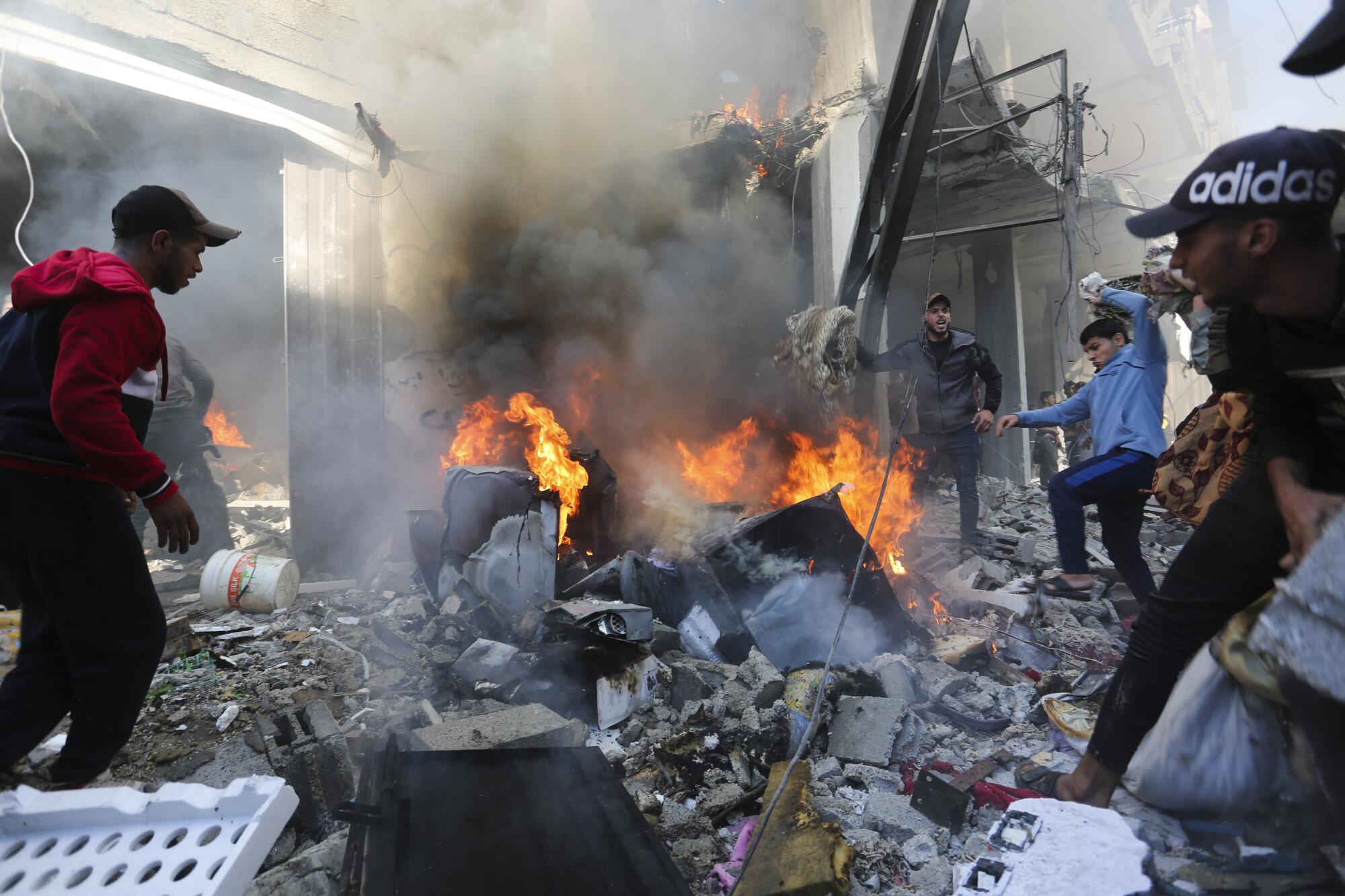
The U.N. agency for Palestinian refugees, known as UNRWA, was unable to bring in its aid convoy Friday because of the cutoff, said spokesperson Juliette Touma.
Israeli forces, meanwhile, have signaled that they could expand their offensive toward Gaza’s south even while continuing operations in the north. Troops have been searching the territory’s biggest hospital for traces of a Hamas command center that the military alleges operates under the building.
Rescuers in Gaza don’t have the equipment, manpower or fuel to search properly for the living, let alone the dead buried among mounds of rubble.
They have shown what they said was a tunnel entrance and weapons found inside the compound but not yet any evidence of a command center, which Hamas and staff at Gaza City’s Shifa Hospital deny exists.
The war, now in its sixth week, was triggered by Hamas’ Oct. 7 attack in southern Israel, in which the militants killed more than 1,200 people, mostly civilians, and kidnapped some 240 men, women and children. Israeli Prime Minister Benjamin Netanyahu has said his forces will not agree to a cease-fire before the hostages are released.
Israeli officials had previously vowed fuel would not be let in until Hamas militants free the hostages. The government has been under heavy public pressure in Israel to show it is doing all it can to bring back those abducted in Hamas’ attack.
Thousands of marchers — including families of over 50 hostages — embarked Friday on the fourth leg of a five-day walk from Tel Aviv to Jerusalem, chanting, “Bring them home!”
The marchers were traversing the 45 miles to Netanyahu’s office, calling on the unpopular leader and his war Cabinet to do more to rescue their loved ones. They have urged the Cabinet to consider a cease-fire or prisoner swap to gain the hostages’ release.
Hamas has offered to exchange all hostages for some 6,000 Palestinians in Israeli jails, which the Cabinet has rejected.
On Friday, the Israeli military said it found the body of another hostage, Cpl. Noa Marciano. Marciano’s body was recovered in a building adjacent to Shifa, the military said, like that of another hostage found Thursday, 65-year-old Yehudit Weiss. Hundreds of mourners, many carrying Israeli flags, attended Marciano’s funeral Friday in her hometown of Modi’in.
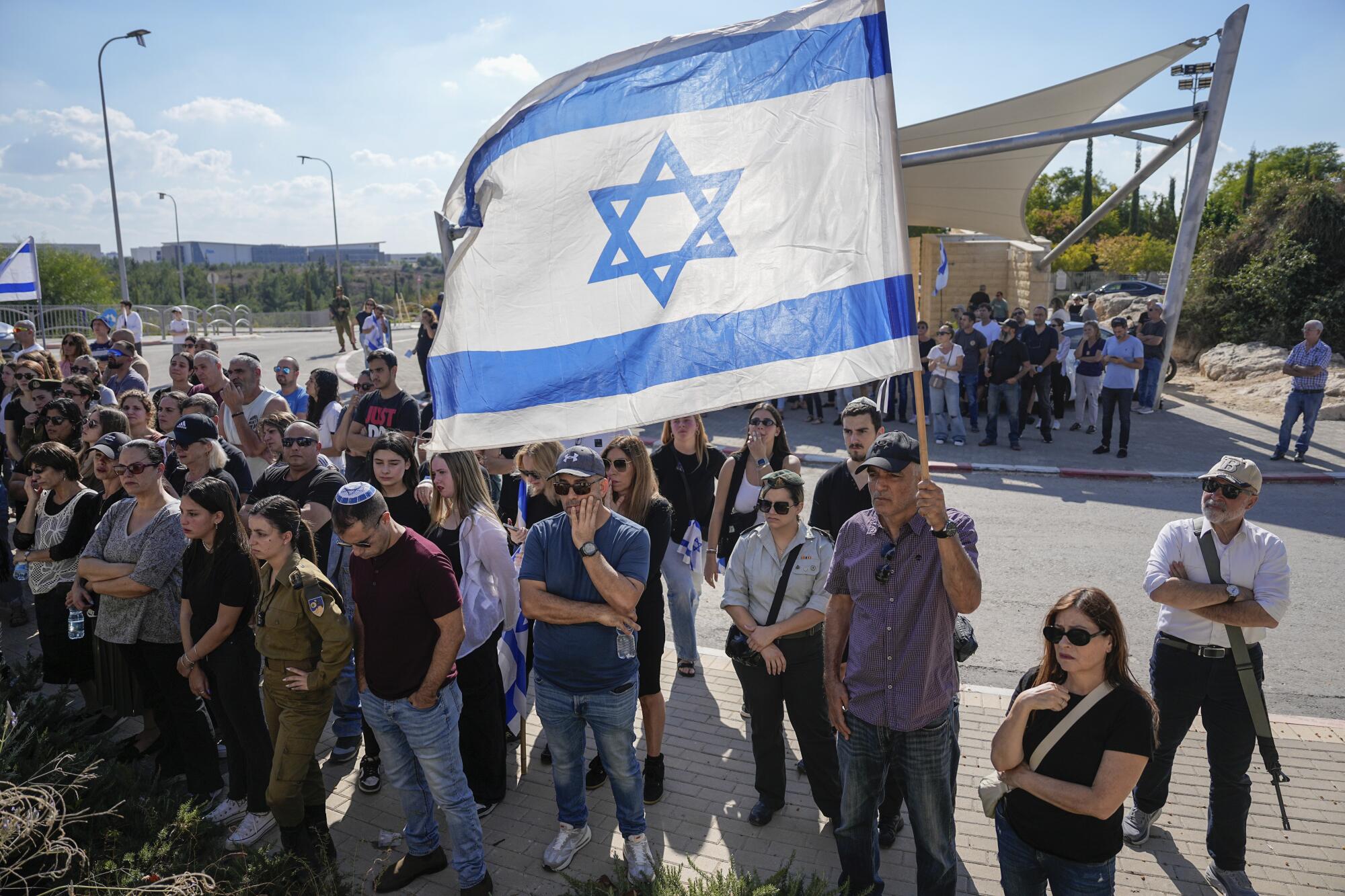
More than 11,400 Palestinians have been killed in the war, two-thirds of them women and children, according to Palestinian health authorities. An additional 2,700 have been reported missing, believed buried under rubble. The count does not differentiate between civilians and militants, and Israel says it has killed thousands of militants.
After an American request, Israel agreed to allow two tanker trucks of fuel into the Gaza Strip each day — a quantity that national security advisor Tzachi Hanegbi called “very minimal.” COGAT, the Israeli military body responsible for Palestinian affairs, said it would amount to 15,850 gallons a day for the U.N.
A U.S. State Department official said Israel also agreed to let in 2,640 gallons a day for the communications network.
Touma said UNRWA and other humanitarian groups need at least 31,700 gallons a day to run lifesaving functions. It was not immediately known if the fuel for communications would be enough to revive the network.
Since the war began, Gaza has received only 10% of its required food supplies each day in shipments from Egypt. The breakdown of water and sewage systems has left 70% of the population drinking brackish or contaminated water, causing an outbreak of water-borne diseases. Dehydration and malnutrition are growing with nearly all residents in need of food, said Abeer Etefa, a Mideast regional spokeswoman for the United Nations’ World Food Program.
“People are facing the immediate possibility of starvation,” she said Thursday from Cairo.
A forensic investigator in Tel Aviv works to reassemble remains of victims of Hamas militants, trying to understand the causes of death and the underlying cruelty.
Speaking from Shifa Hospital on Friday, Dr. Ahmad Mukhalalti told Al Jazeera television that there was no electricity to run ventilators to provide ICU patients with oxygen, and that of the 36 infants there, most are suffering from severe diarrhea because there is no clean water to give them.
He added that Israeli troops, who stormed into the hospital Wednesday, had brought food and bottled water but that it had not been enough for the number of people in the hospital.
Shifa’s director, Muhammad Abu Salima, told Al Jazeera that 52 patients have died since fuel ran out a week ago — up from 40 reported dead before Israeli troops stormed in on Wednesday. He said staff were amputating limbs of some injured to avoid infection spreading because of shortages in medicines.
More were on the verge of death as their wounds are “open with maggots coming out of them,” said another doctor, Fiasal Siyam. Their accounts could not be independently verified.
Abu Salima said Israeli troops should either bring them fuel to power equipment or allow an evacuation.
“The hospital has become a giant prison,” he said. “We are surrounded by death.”
Israel’s military said it delivered 4,000 liters of water and 1,500 ready-made meals to Shifa. Abu Salima said nearly 7,000 people were trapped there, including patients, staff and displaced civilians.
Israeli military spokesman Col. Richard Hecht acknowledged that the troops’ search for traces of Hamas was going slowly. “It’s going to take time,” he said.
Israel faces pressure to prove its claim that Hamas set up its main command center in and under the hospital. So far, Israel has mainly shown photos and video of weapons caches that it says its soldiers found inside,
On Thursday, the military released video of a hole in Shifa’s courtyard it said was a tunnel entrance. It also showed several assault rifles and rocket-propelled grenades, hand grenades and ammunition clips it said were found in a pickup truck in the courtyard. The AP could not independently verify the Israeli claims.
The allegations are part of Israel’s broader accusation that Hamas uses Palestinians as human shields across the Gaza Strip, contending that is the reason for the large numbers of civilian casualties during weeks of bombardment.
Gaza’s Hamas-run Health Ministry said the troops searched underground levels of the hospital Thursday and detained technicians who run its equipment.
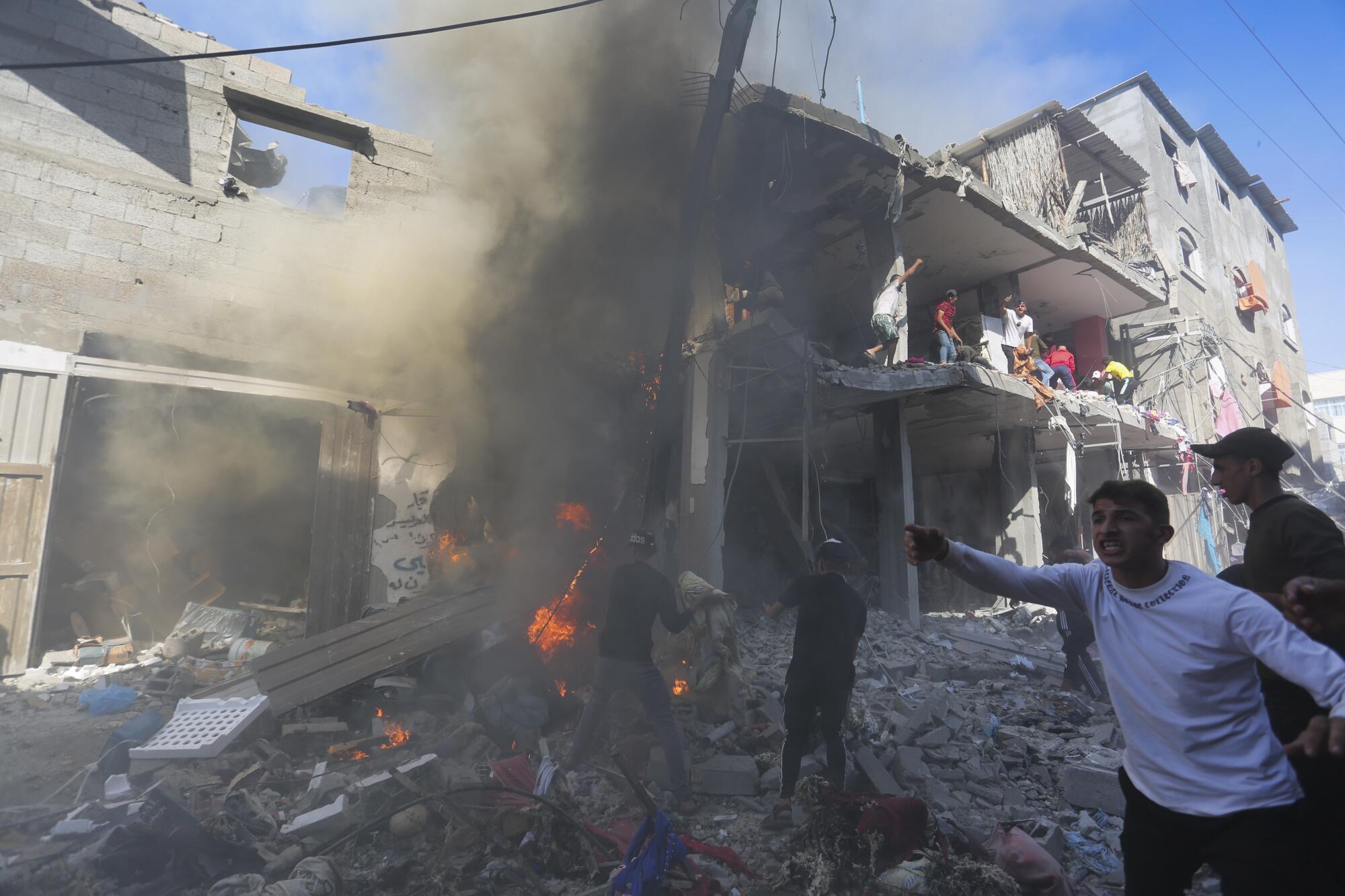
Breaking News
Get breaking news, investigations, analysis and more signature journalism from the Los Angeles Times in your inbox.
You may occasionally receive promotional content from the Los Angeles Times.
Following the surprise attack by Hamas, Israel has focused its air and ground assault on northern Gaza, vowing to remove Hamas from power and crush its military capabilities.
In recent days, Israel’s military has indicated that it could expand operations in the south.
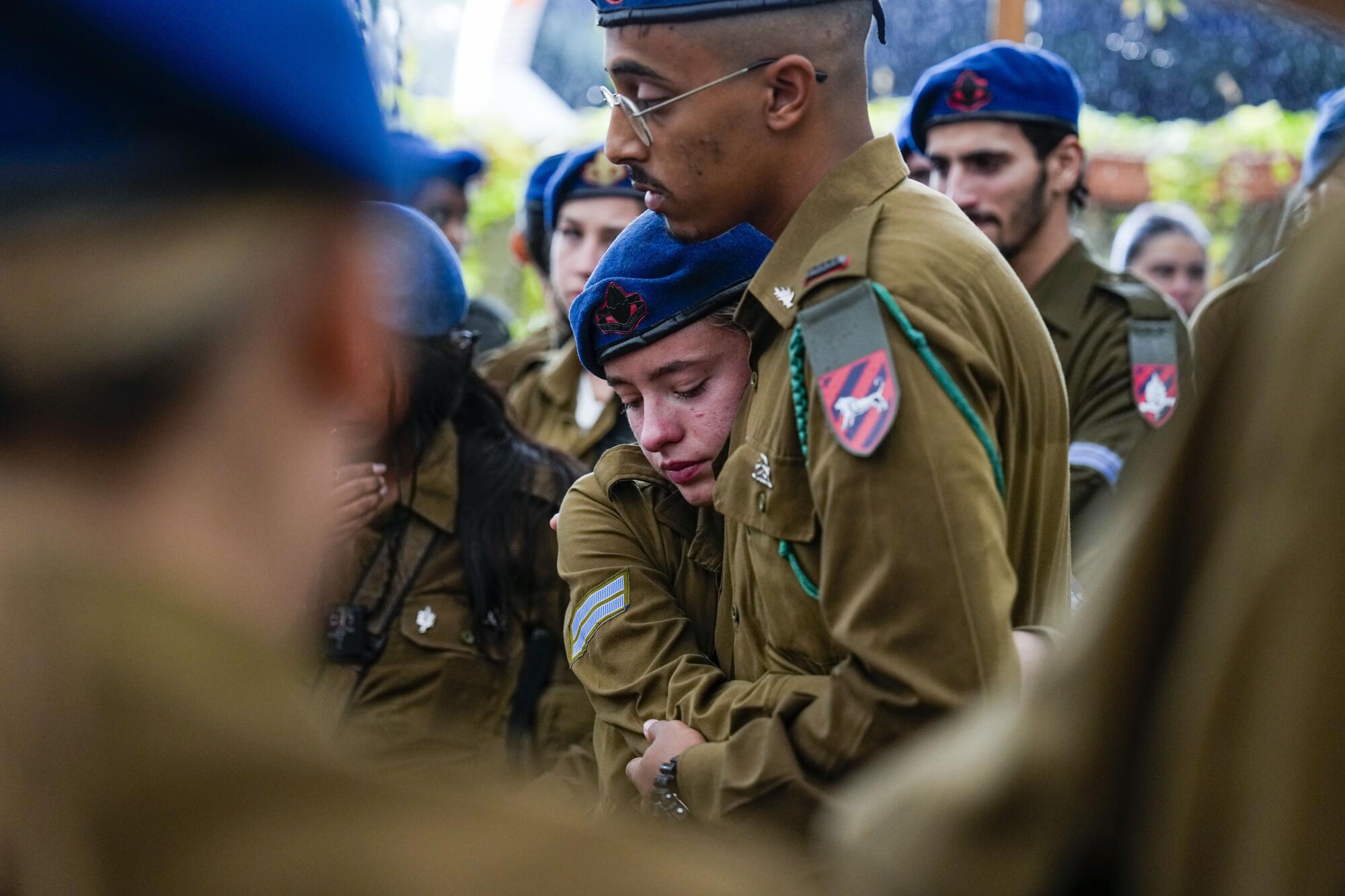
“We are close to dismantling the military system that was present in the northern Gaza Strip,” Chief of Staff Lt. Gen. Herzl Halevi said Thursday.
In recent days, Israel’s military has indicated that it could expand operations already underway in the south.
Israeli forces dropped leaflets Wednesday afternoon telling Palestinians in areas near the southern town of Khan Yunis to evacuate.
Two homes east of Khan Yunis were hit by Israeli airstrikes late Thursday and early Friday, according to survivors.
Lebanon-based Hezbollah is holding back from all-out war with Israel for now — but chances of a dangerous miscalculation by either side are high.
Airstrikes continued to hammer southern Gaza, where hundreds of thousands of people have gathered after heeding Israel’s calls to evacuate Gaza City and the north to get out of the way of its ground offensive.
In the Nuseirat refugee camp, a strike crushed a building to rubble, killing at least 41 people, staff at the nearby hospital said. Residents said dozens more were buried in the wreckage.
Early morning strikes outside the city of Khan Yunis killed 11 members of a family who had evacuated from Gaza City. Dozens of wounded, including babies and young children, streamed into the nearby hospital.
At the morgue, Alaa Abu Hasira wept over the bodies from the strike, lying side by side on the floor, including her son, daughter and several sisters. “All my loved ones are gone. All my loved ones are gone,” she sobbed.
In all, some 1.5 million people have been driven from their homes.
If the assault moves into the south, it is not clear where people could go, as Egypt refuses to allow a mass transfer onto its soil. The Israeli military has called on people to move to a “safe zone” in Mawasi, a town on the Mediterranean coast a few square miles in area.
Hamas’ attack on Israel has hardened the settler movement. Increasing violence in the West Bank threatens to open another front in the conflict.
The heads of 18 U.N. agencies and international charities on Thursday rejected that proposal, saying that concentrating civilians in one area while hostilities continue was too dangerous. They called for a cease-fire and the unimpeded entry of humanitarian aid and fuel.
As the war continues to inflame tensions elsewhere, Israeli troops clashed with Palestinian gunmen in Jenin in the occupied West Bank, killing at least three Palestinians. The fighting broke out late Thursday during an Israeli raid.
Israel’s military said five militants were killed. The Palestinian Health Ministry said three people died. The militant Islamic Jihad group claimed the three dead as members and identified one as a local commander.
More to Read
Sign up for Essential California
The most important California stories and recommendations in your inbox every morning.
You may occasionally receive promotional content from the Los Angeles Times.
